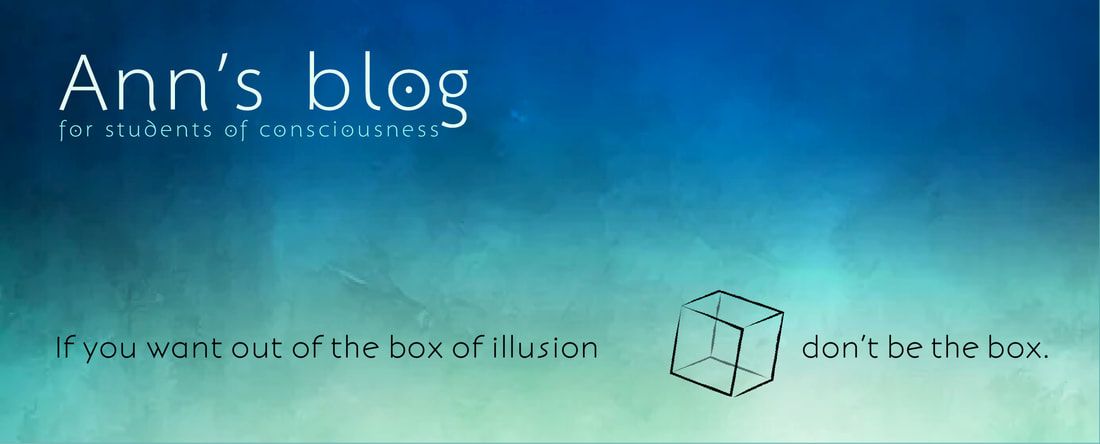|
Every step on the inner path, however seemingly small, Ann K Gryczan Maybe we have all done this: made a mistake, even a long time ago, that still seems so grievous and painful to our sensibilities that we can’t let it go. And yet, at the time, it made sense; it was what we wanted, or we were acting on automatic, unthinking and oblivious. Only later, do we realize the true consequences and harm that resulted. But it cannot be undone. The error part of our ‘trial and error’ life is the part that seems so hard! But this is also the part with all the richness, because inside every mistake is a stepping stone on the path to Self. Forgiveness completes the step, but how do you forgive yourself so that it is real? So that it sticks? Forgiveness Before forgiving ourselves, we usually have to at least try to rectify a mistake. After all, we can’t just run over someone’s groceries out of spite, forgive ourselves and drive on. Rectifying a mistake – making it right – is very healing, for us and all of life. Basically, it means that we look into the depths of the ignorance from which our action came – reflect on its motivations and consequences, make amends and learn the lessons. Now we are ready to take the steps of forgiveness. Each step draws us closer to a greater paradigm, with more access to love and truth. That is the opportunity but also the risk, because as you may know, the ego/mind hates a new paradigm. Ready? Here are the steps: Step One: Describe the mistake for which you seek forgiveness. In as few words as possible, describe the mistake.
Step Two: Be present with the pain of the mistake. Allow the pain to touch you. How?
Maybe just thinking of the mistake feels painful. And yet, when we made it, it wasn’t painful – we were oblivious. Ignorance is essentially our alignment with the ego’s belief that it is distinct and separate from life. This is a really painful illusion, but ignorance doesn’t feel any pain. So the pain we feel now is illuminating our evolution, showing us how we have grown and become more aware of the significance and responsibility of our presence in life. Step Three: Remember the person or persons involved in the event or circumstance. Recall him, her or them, allowing all the associated images, words, memories and senses into the mind.
Step Four: With the true regret you feel, say to him, her or them, I’m sorry.
Or, say a variation: I am sorry, or, I am so sorry. Say it with your whole heart. Find and draw upon the true, deep feelings within you. Add no other concepts than the expression of regret and apology. In this step our purpose is only to express the deep remorse we feel, using the words as a vehicle. Step Five: Say, I forgive you; be forgiving.
Use precisely these words; don’t say, I forgive myself or use any other words.
As you say the words, be allowing and forgiving. ‘I’ and ‘you’ are general and infinite; you are simply in the experience of forgiveness. Be forgiving. Being forgiving is like being generous or being hungry. When you truly experience either of these states you are not trying, acting or performing; you become them – you are generous or you are hungry. It is the same with forgiveness; be forgiving. Step Six: Accept forgiveness. Start with the physical experience:
Complications Accepting forgiveness can sometimes seem like the hardest step, but it is also one of the most powerful things we can do as human beings. The acceptance in this step is a conscious act of evolution: by our own will we let go of a previous paradigm (shame, fear, being wrong), and by accepting love – which is what forgiveness is – become it. We gain entry to a greater paradigm, our experience of life expands, we are more Self, less ego. Forgiveness is like a doorway: by entering, we become what we are now and leave behind what we were. But we may not want to! This is the real struggle with forgiveness (of ourselves or others). So here, at the very last step, the ego might have lots of reasons for why forgiveness is not possible. Remember, it has a lot to lose! Every step we take into becoming the truth of what we really are is a step away from the ego – and it needs our life energy to flourish. Let’s see what the ego’s reasons are. Let’s let all the reasons have their say and stand here, naked, in the light of our awareness. Reason One: It is Unforgivable Really? Let’s look at the sequence of events that brought us to this point:
One thing to notice is that if we can feel the pain of the mistake (or if the pain is now greater than whatever was driving the mistake), it means we woke up. And that is the path: to wake up from the anesthesia. Remember ignorance? The illusion of being separate from life? That is how the illusion of being separate from life acts; that is how ignorance acts. Of course we did then what we did. Now that we can see the illusion at the source of the action, we are beyond it. We are more in touch with the divine light of life that is our true nature. It is possible now to feel embraced by the love that comes with this understanding. This is what we find out with every step of awakening: ignorance is forgivable because it is not what we are. Realizing this, we can now also see there is nothing to forgive. Yes, we experience the consequences of our actions, and sometimes they are very grave. But accepting consequences is different than not being forgivable. The trick is to not let the ego/mind get attached to the consequences, but to accept them gratefully and use them as stepping stones back to ourselves. Reason Two: Guilt Sometimes guilt has deep roots that seem connected to a zillion wrong things since forever. If so, this requires our gentle attention as we bring the light of awareness into each wrong thing, to heal and see it in a new light. But here is what we will always find as the final piece of guilt: the ego likes it. The ego/mind actually likes guilt. Notice how this is so: how comfortable, familiar and safe is guilt. Or how pleasurable; a distraction and ready excuse for our limitations. Or even a game, the ego playing both sides: punisher and punished. Ego’s love guilt, and of course they do as it is very egocentric. So we don’t blame them for wanting to roll around in it, but as students of consciousness, we can ask ourselves,
Reason Three: We Might do it Again We might like to think being unforgiven keeps us from making the same mistake, but that is not true. If we have not done it again that is because we chose not to do it again. We chose out of the power of what we are now. The ‘We Might do it Again’ excuse is like leaving the training wheels on and pretending they are keeping the bike upright. This is one of the ego’s zillion versions of a no-risk, no-responsibility position – one of the ego’s favorites. It is a way of pretending that we are not answering the eternal question: Self or ego? But we are answering. The thing about waking up is that it can be hard to pretend to be ignorant again. Waking up can feel bracing and make us want to burrow back into the dark warmth of ignorance. But we did wake up, so now we have two choices: pretend we didn’t – or pedal on. That’s life! Reason Four: Being Unworthy and Undeserving
Simply by existing within the infinite oneness of all creation, all things are worthy of reverence – including us. But accepting this truth can feel very vulnerable. Be vulnerable. Let the infinite presence of life melt you and take away your defenses against it. Be absolved and let cold isolation flow away. As with guilt, we may need to bring our attention to whatever sustains the ideas of ‘unworthy’ and ‘undeserving’ to heal and release them. After following the roots all the way to their source, we will discover the ego, trying to maintain its separate relevance against the sea of life. We can see now that the ego/mind and its perceptions are not life and do not really have existence – just as we discover with every illusion we unwind. The Ego’s Ways So what about all the bad actions, mean thoughts, vengeance, hatred, greed, and all the rest of it? The ego can behave in ways that appear ugly and dark, and when we become aware of its hidden motives and designs we see them as contrary to our true natures. And they are. The ego seems to be part of our nature, but it really is not. The ego/mind is essentially the animal instinct; we are responsible for its expressions, but we are not it. That is why it feels painful each time we realize a deeper layer of its purposes. But this is also our freedom because now we can choose differently – when in our previous ignorance we could not. Accepting Forgiveness Forgiveness is nothing but love; accept it and let go of one more layer of separation. Open into the eternal oneness of All That Is and realize you are that. Forgiveness is accepting the next step on the path of life. We step into the light and open air where there is always the risk of tripping up and making another mistake (and we will!). And therein is our next step on the path to Self. How to Forgive Yourself In summary,
Get the latest posts delivered to your inbox!
Find out more about Paradigm Practice — a powerful method for healing and spiritual development. Comments are closed.
|
Learn about Paradigm Practice Receive the
Paradigm Practice Handbook & Audio Guide Guided
|

-
We may at first have thought consciousness was in the mind, or even thought it was the mind itself. That it was somehow part of our domain; our personal interface with life or our go-to source of thinking and reason.
Exploring the mind however, we discover it is not consciousness that is personal, but the mind. We discover the mind is limited and finite and that we can go beyond it — to consciousness itself. Even as a new explorer, we are aware of something here vast and whole, an infinite peace, potent and complete. And we know — as if remembering — that this is also the intrinsic, intimate truth of ourselves.
Welcome!
This is a blog for those who travel an inner path, seeking truth, beauty and the source of being.
Here are ideas and practices to help and encourage the traveler, and to address the obstacles that we, as students of consciousness, inevitably encounter. Everything you find here you can do at anytime and take as far as you want.
This is a blog for those who travel an inner path, seeking truth, beauty and the source of being.
Here are ideas and practices to help and encourage the traveler, and to address the obstacles that we, as students of consciousness, inevitably encounter. Everything you find here you can do at anytime and take as far as you want.
|
I invite you to use Paradigm Practice as a foundation for your practice, which you may find here, free and available for your use. Paradigm Practice is a powerful guide for bridging the gap between limitation and new awareness. Awakening into the happiness and peace of your true nature benefits all the world. May you be blessed on your journey!
Ann |
Consciousness is the ultimate teacher: it is always showing us what we are.
About| Kumu Consulting
|
|
Copyright © 2024 Kumu Consulting, All Rights Reserved





 RSS Feed
RSS Feed